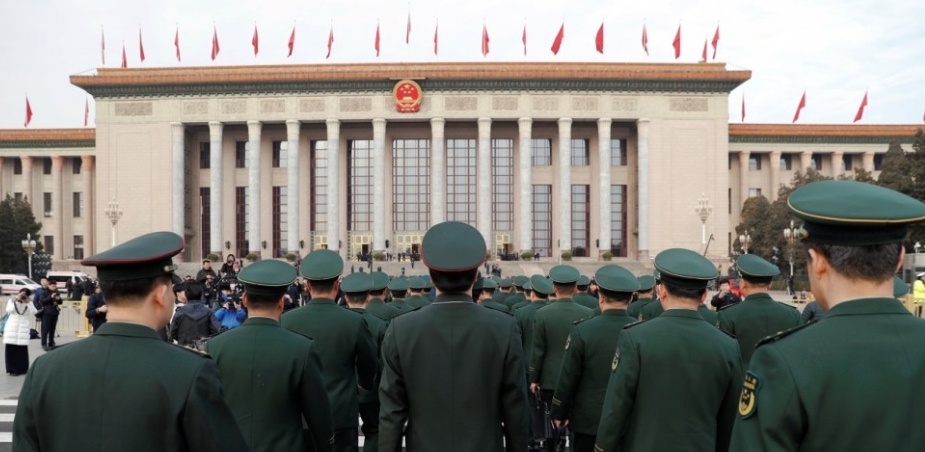
Investors keep close eye on potential key policy signals from the ‘Two Sessions’ that kicked off on Monday in Beijing
Defence shares led Chinese mainland stocks higher on Monday after Premier Li Keqiang said growth in the nation’s military spending will accelerate in the opening session of the annual legislative meeting. Hong Kong stocks tumbled the most in three weeks on renewed concern a looming trade war will dent global growth.
The Shanghai Composite Index added 0.1 per cent, or 2.40 points, to 3,256.93 at the close. Hong Kong’s Hang Seng Index shed 2.3 per cent, or 697.06 points, to 29,886.39, extending a weekly loss after US President Donald Trump decided to impose tariffs on imports of steel and aluminium.
In the annual work report delivered to the delegates of the National People’s Congress, Premier Li said China will boost its military expenditure by 8.1 per cent, or 1.1 trillion yuan (US$174 billion) in 2018. That compared with a 7.1 per cent growth rate a year earlier. The annual target for economic growth was set at around 6.5 per cent and the deficit goal was lowered to 2.6 per cent of gross domestic product from 3 per cent over the past two years, the first cut since 2012, according to the report.
“China needs money to develop its sophisticated weapons so we’ll see a constant increase in the military budgets and that serves as catalyst for military stocks,” said Wei Wei, a trader at Huaxi Securities in Shanghai. “For Hong Kong, the stocks are still in the downward trajectory and aren’t likely to bottom out soon.”
Shanghai Huace Navigation Technology, a maker of global navigation satellite systems, surged by its daily limit of 10 per cent to 44.63 yuan. Avic Electromechanical Systems jumped 5.9 per cent to 10.24 yuan. Avic Shenyang Aircraft advanced 1.3 per cent to 30.03 yuan. Xi’an Chenxi Aviation Technology gained 2.7 per cent to 28.59 yuan. China Aerospace Times Electronics added 1.9 per cent to 7.63 yuan.
Cement and paper makers, dropped in mainland trading after Li’s work report mentioned that China will further crack down on pollution.
Anhui Conch Cement lost 1.9 per cent to 31.66 yuan and Fujian Cement slid 1.2 per cent to 6.90 yuan. Shandong Sun Paper Industry declined 3.2 per cent to 11.86 yuan and Shanying International Holding, a producer of packaging papers, retreated 1.9 per cent to 5.13 yuan.
Historical data showed that the Shanghai Composite does not have a record of faring well in the span of the legislative NPC and the advisory consultative meeting, an annual ritual known as “the two sessions”. The gauge fell an average 0.7 per cent during the period since 2000 while it rose 1.9 per cent on the average two weeks after the sessions.
In Hong Kong, the Hang Seng China Enterprises Index, known as the H-shares index, fell 1.7 per cent.
Most blue chips fell. Index heavyweight HSBC was down 1.6 per cent to HK$75.95. China Construction Bank traded 2.8 per cent lower at HK$7.78. China Mobile pulled back 3.2 per cent to HK$70.30. Wharf Holdings gave up 2.1 per cent to HK$28.60 after it was removed as a constituent from the Hang Seng Index.
Domestic car makers were mixed, although Li said China will reduce import tariffs on cars and some consumer goods, to “promote industrial upgrade, and balanced trade development”.
Geely Automobile Holdings lost 2.4 per cent to HK$24.25 and Dongfeng Motor Group sank 1.2 per cent to HK$9.67. Electric car maker BYD added 0.7 per cent to HK$71.40 and Brilliance China Automotive Holdings added 0.1 per cent to HK$20.

